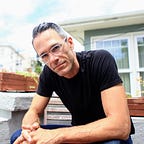The Causes We Click (and Die) For
The series “Guidance Systems” discusses technologies that seem to improve our lives by offering us new choices, while in fact shaping or removing our ability to decide things for ourselves.
The job description is daunting: find people so committed to a cause that they’d fight and die for it, then get close enough to them that you can truly understand their commitment. That’s what a gig at Artis International entails. The researchers that make up this think tank seek out, befriend, and study the world’s most maniacal fighters in the bloodiest conflicts on earth. And in the process, they’re discovering that the systems that make us human may not make us the kind of humans we’d like to think we are.
Lydia Wilson, an Artis research fellow, studied history at Cambridge and has lived and worked in Syria, Beirut, Kosovo, Jordan. She speaks Arabic, and is considered one of the more fearless members of the team. Often her interviews take place where even journalists don’t go. “At one point I was interviewing a Peshmerga general on the front line,” she remembers, “and the person left in command in his absence was a friend of mine.” (The Peshmerga are the military forces of Iraqi Kurdistan.) “As we were driving away afterward, he asked ‘didn’t you hear ISIS attack during your conversation?’ I hadn’t. In the transcript of the interview I ask ‘Is it raining?’” She laughs.
